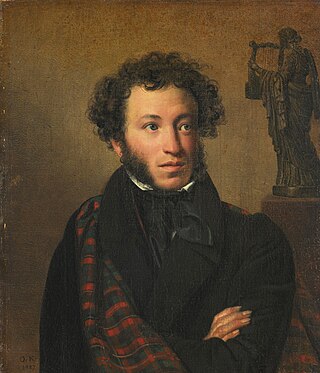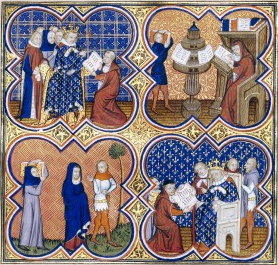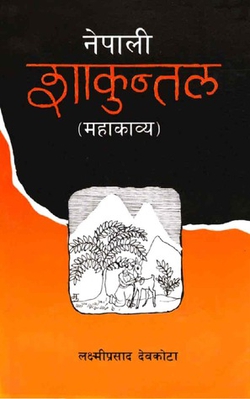
Haiku is a type of short form poetry originally from Japan. Traditional Japanese haiku consist of three phrases composed of 17 phonetic units in a 5, 7, 5 pattern; that include a kireji, or "cutting word"; and a kigo, or seasonal reference. Similar poems that do not adhere to these rules are generally classified as senryū.
Old English literature refers to poetry and prose written in Old English in early medieval England, from the 7th century to the decades after the Norman Conquest of 1066, a period often termed Anglo-Saxon England. The 7th-century work Cædmon's Hymn is often considered as the oldest surviving poem in English, as it appears in an 8th-century copy of Bede's text, the Ecclesiastical History of the English People. Poetry written in the mid 12th century represents some of the latest post-Norman examples of Old English. Adherence to the grammatical rules of Old English is largely inconsistent in 12th-century work, and by the 13th century the grammar and syntax of Old English had almost completely deteriorated, giving way to the much larger Middle English corpus of literature.

Alexander Sergeyevich Pushkin was a Russian poet, playwright, and novelist of the Romantic era. He is considered by many to be the greatest Russian poet and the founder of modern Russian literature.

The Tale of Genji is a classic work of Japanese literature written in the early 11th century by the noblewoman and lady-in-waiting Murasaki Shikibu. The original manuscript, created around the peak of the Heian period, no longer exists. It was made in "concertina" or orihon style: several sheets of paper pasted together and folded alternately in one direction then the other.
In linguistics, a neologism is any relatively recent or isolated term, word, or phrase that nevertheless has achieved popular or institutional recognition, and is becoming accepted into mainstream language. Most definitively, a word can be considered a neologism once it is published in a dictionary. The most precise studies into language change and word formation, in fact, identify the process of a "neological continuum": a nonce word is any single-use term that may or may not grow in popularity; a protologism is such a term used exclusively within a small group; a prelogism is such a term that is gaining usage but still not mainstream; and a neologism has become accepted or recognized by linguistic institutions.
Indian poetry and Indian literature in general, has a long history dating back to Vedic times. They were written in various Indian languages such as Vedic Sanskrit, Classical Sanskrit, Telugu, Tamil, Odia, Maithili, Kannada, Bengali, Assamese, Urdu, and Hindi. Poetry in foreign languages such as English also has a strong influence on Indian poetry. The poetry reflects diverse spiritual traditions within India. In particular, many Indian poets have been inspired by mystical experiences. Poetry is the oldest form of literature and has a rich written and oral tradition.

Per Petterson is a Norwegian novelist. His debut book was Aske i munnen, sand i skoa (1987), a collection of short stories. He has since published a number of novels to good reviews. To Siberia (1996), set in the Second World War, was published in English in 1998 and nominated for the Nordic Council Literature Prize. I kjølvannet, translated as In the Wake (2002), is a young man's story of losing his family in the Scandinavian Star ferry disaster in 1990 ; it won the Brage Prize for 2000. His 2008 novel Jeg forbanner tidens elv won the Nordic Council Literature Prize for 2009, with an English translation published in 2010.

Christian literature is the literary aspect of Christian media, and it constitutes a huge body of extremely varied writing.
Nepalese literature is the literature of Nepal. This is distinct from Nepali literature, which is the literature in only Nepali language. The major literary languages of Nepal are:
Shun Medoruma is a Japanese writer, who, along with Tatsuhiro Oshiro, Tami Sakiyama, and Eiki Matayoshi, is one of the most important contemporary writers from Okinawa, Japan. Early in his career he won the 11th Ryukyu Shimpō Short Story Prize in 1983 for "Taiwan Woman: Record of a Fish Shoal" ("Gyogunki"), translated by Shi-Lin Loh in Islands of Protest: Japanese Literature from Okinawa, and the New Okinawan Literature Prize in 1986 for "Walking the Street Named Peace Boulevard". He was awarded the 27th Kyushu Arts Festival Literary Prize and the 117th Akutagawa Prize in 1997 for his short story "A Drop of Water" ("Suiteki"). In 2000 his short story "Mabuigumi" won the prestigious Kawabata Yasunari and Kiyama Shōhei literary prizes. Medoruma also wrote the screenplay for the film Fūon:The Crying Wind, which received the Montreal Film Festival Innovation Prize in 2004, and published a novel based on the screenplay the same year. His critically acclaimed novel In the Woods of Memory is the first full-length novel by an Okinawan writer to be translated and published in English.

Indian Literature is an English language literary journal published bi-monthly by the Sahitya Akademi, India's National Academy of Letters. It was first launched in 1957, and is currently edited by British-Indian journalist Antara Dev Sen.

Translation is the communication of the meaning of a source-language text by means of an equivalent target-language text. The English language draws a terminological distinction between translating and interpreting ; under this distinction, translation can begin only after the appearance of writing within a language community.
Kunwar Narayan was a poet in Indian literature in Hindi. He read and traveled widely and wrote for six decades. He was linked to the New Poetry movement.

The American University in Cairo Press is the leading English-language publisher in the Middle East.
Tibetan literature generally refers to literature written in the Tibetan language or arising out of Tibetan culture. Historically, Tibetan has served as a trans-regional literary language that has been used, at different times, from Tibet to Mongolia, Russia, and present-day Bhutan, Nepal, India, and Pakistan. Today, the term Tibetan literature can also be applied to any work by an ethnic Tibetan person or arising out of Tibetan folk culture; contemporary Tibetan writers sometimes use Chinese, English, or other languages to compose their work.
Shiv K. Kumar was an Indian English-language poet, playwright, novelist, and short story writer. His grandfather late Tulsi Das Kumar was a school teacher and his father Bishan Das Kumar, was a retired headmaster. The letter 'K' stands for Krishna, i.e. Shiv Krishna Kumar.

Indra Bahadur Rai was an Indian Nepali language writer and literary critic from Darjeeling, India. He wrote multiple essays, short stories, novels and criticism in his lifetime. Kheer and Raat Bhari Huri Chalyo are some of his most popular stories. He started a literary movement in Nepali literature known as Tesro Aayam with Ishwar Ballav and Bairagi Kainla. In 1977, he won the first ever Sahitya Akademi Award for Nepali language.
Up to the second half of the 20th century, Tanzanian literature was primarily oral. Major oral literary forms include folktales, poems, riddles, proverbs, and songs. The majority of the oral literature in Tanzania that has been recorded is in Swahili, though each of the country's languages has its own oral tradition. The country's oral literature is currently declining because of social changes that make transmission of oral literature more difficult and because of the devaluation of oral literature that has accompanied Tanzania's development. Tanzania's written literary tradition has produced relatively few writers and works; Tanzania does not have a strong reading culture, and books are often expensive and hard to come by. Most Tanzanian literature is orally performed or written in Swahili, and a smaller number of works have been published in English. Major figures in Tanzanian modern literature include Shaaban Robert, Muhammed Said Abdulla, Aniceti Kitereza, Ebrahim Hussein, Abdulrazak Gurnah and Penina Muhando.
Kumar Pradhan was an Indian historian and writer whose research interests include the History of the Eastern Himalayas, Genealogical studies and the Nepali literature. Pradhan has also edited and written a number of literary journals and anthologies and published learned articles in Nepali. He was the chief editor of Sunchari Samachar and other prominent Nepali newspapers.

Shakuntala is a 1945 Nepali epic poem written by Laxmi Prasad Devkota and published by Sajha Publications. It is considered to be one of the greatest works of Laxmi Prasad Devkota and indeed of the entire Nepali literature.










